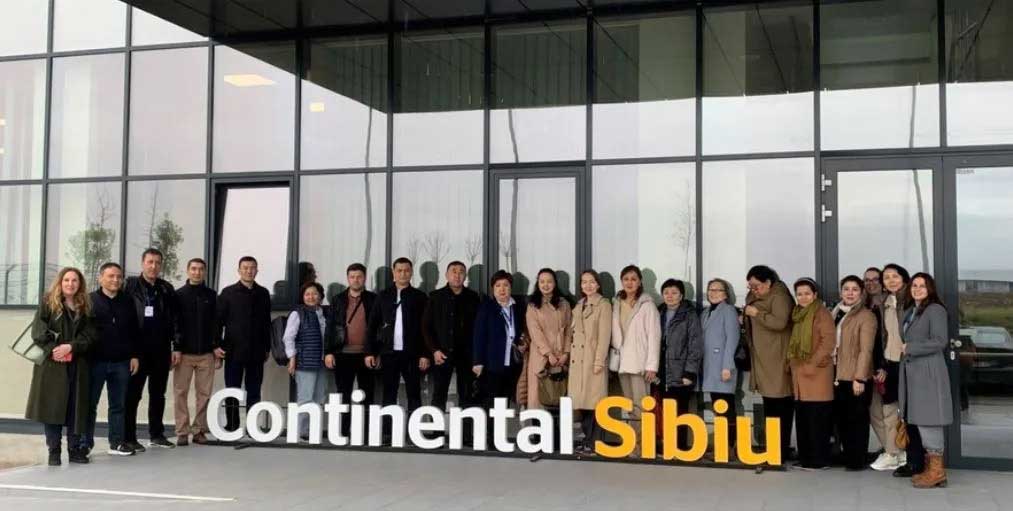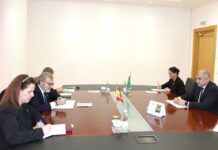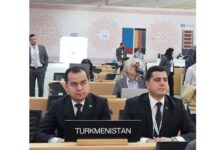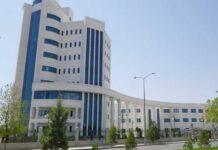Within the framework of the Erasmus+ project “The Capacity Building in Higher Education (CBHE)” – “Bridging environmental concerns, societal needs, and good governance in Central Asian education and employment sectors” (ESGCA), a group of specialists consisting of teachers from the State Energy Institute of Turkmenistan and the Yagshygeldi Kakayev International oil and gas university made a business trip to the city of Sibiu (Romania) from March 22 to 28, 2025. The purpose of this trip was to participate in short-term trainings on the development of a master’s program covering ecosystem and social challenges, as well as good governance issues. The Lucian Blaga University in Sibiu (Universitatea “Lucian Blaga” din Sibiu) was selected as a partner institution for the implementation of this program.
Recall that the ESGCA project, envisaged in the Erasmus+ program for 2021-2027, which aims to improve educational programs in the field of ecology and sustainable development for the countries of Central Asia, has a significant impact on improving the quality of higher education in the region. Its key objective is to integrate environmental issues with societal needs and good governance principles. The participants of this project are leading universities from Italy, Romania, Slovakia and a number of countries in the Central Asian region. The goal of the project initiative is to improve sustainable development in Central Asia through the integration of environmental aspects into educational programs and employment systems. The project is focused on the creation and implementation of effective approaches to solving environmental problems in the region, combining them with the needs of society and the development of educational and labor skills.
As part of the trip, a rich program was organized, including lectures, seminars, discussions and practical exercises aimed at studying key aspects of ESG and sustainable development.
In the course of trainings, participants learned about advanced teaching methods, innovative approaches in creating educational programs, as well as current global trends in the field of ecology and management. The teachers discussed how to combine theoretical knowledge with practical skills needed to train specialists who will be able to work in the field of ecology, social management and sustainable development.
Special attention was paid to the integration of ecology with social and economic aspects, as well as to the development of programs that could ensure sustainable development in Central Asia. Training participants exchanged experience, discussed different approaches to the educational process and got acquainted with practical examples of successful programs implemented in other countries.
One of the key aspects of the project is international cooperation. The Erasmus+ program is an excellent platform for exchanging experience and establishing partnerships between universities and educational institutions in Europe. This exchange not only contributes to the professional development of the participants, but also to the strengthening of international ties in the field of education and science. Teachers from different countries, including Romania, Kazakhstan, Kyrgyzstan and other Central Asian states, shared their knowledge, practical experience and results of previous initiatives. This cooperation not only improves the quality of educational programs, but also strengthens international ties between higher education institutions, creating a platform for further knowledge exchange and joint scientific research. After completing the trainings, the teachers will return to developing the Master’s program in Ecology and Social Issues, taking into account the knowledge and recommendations they have received. The new Master’s programme being created within the framework of the project is expected to combine theoretical training with practical skills, which will enable graduates to work effectively in the field of environmental and social issues, as well as natural resource management. In addition, the project plans to organize further meetings and trainings that will facilitate the ongoing exchange of experiences and the introduction of the latest educational practices. This will also open up new opportunities for students and teachers in Central Asia, helping to strengthen sustainable development in the region.
In addition to the training program, an excursion was organized to Continental’s tire plant in Sibiu, located in Romania. This enterprise, part of the international concern Continental AG, is one of the leaders in the production of car tires, vehicle systems and technologies for transport infrastructure. An important topic of the visit was the environmental sustainability of production. Continental is actively implementing the concepts of “green production”, which includes the use of environmentally friendly materials, optimization of energy and water consumption, and reduction of carbon dioxide emissions. Teachers received information about the company’s strategies to minimize environmental impact, which is of great importance for educational institutions training future professionals in the field of ecology and sustainable development.
The ESGCA project continues its work and will influence the development of higher education in Central Asian countries, ensuring a future generation of specialists ready to address global environmental and social challenges. This trip was a significant step towards improving the quality of education and training future specialists who will be able to contribute to solving the most pressing environmental and social challenges facing the modern world.









